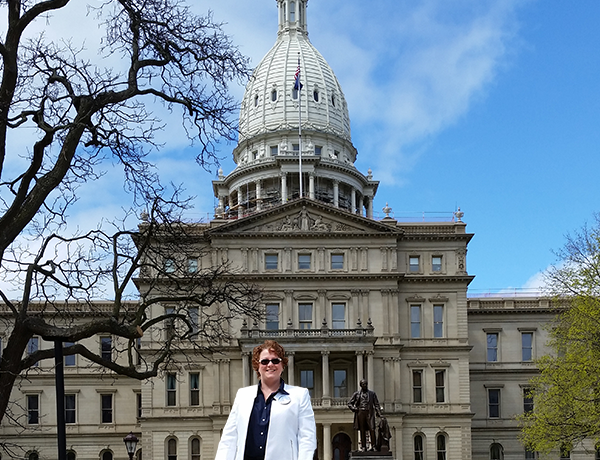 At Residential Hospice and Residential Home Health, we’re tremendously proud of the staff and clinicians who give their all to deliver extraordinary patient care. Yet while we’re thrilled to make an impact on our patients each day, occasionally we learn of some special effort that one of our own has taken to make a difference in other influential ways. Today, we have just such a story to share.
At Residential Hospice and Residential Home Health, we’re tremendously proud of the staff and clinicians who give their all to deliver extraordinary patient care. Yet while we’re thrilled to make an impact on our patients each day, occasionally we learn of some special effort that one of our own has taken to make a difference in other influential ways. Today, we have just such a story to share.
On Wednesday, April 22, Residential Hospice Music Therapist Sara DiCiesare, MT-BC, joined the Michigan Music Therapy Task Force on a day trip to Lansing, Michigan. Learn about these music therapists’ prestigious plans, how they improvised to change course, and why it was so vital for them to stand up and make (sound) waves on the Hill.
Taking a Stand for Michigan Music Therapy Week
In honor of Michigan Music Therapy Week (April 20-24), the task force had arranged to speak at the capitol before state senators and representatives, calling for formal recognition of music therapy and the board certification credential in the state of Michigan. As one of the planned speakers, Sara was thrilled for a chance to educate Michigan lawmakers about how this recognition will offer patients better access to music therapy as well as certainty that their practitioner has the necessary education, training, and credentials to provide this therapy.
Music therapy is an evidence-based discipline that has benefits for numerous conditions throughout all stages of life. Through activities such as lyric analysis, songwriting, playing, listening, or recall, music therapists work one-on-one with patients to provide skilled, personalized care. In hospice settings (the fourth-most-common setting for music therapy in Michigan), therapists like Sara can represent a strong emotional component of a patient’s care team. Moreover, with respect to specific chronic conditions, such as dementia or other cognitive disorders, they can help improve positive functions like focus, as well as reduce negative symptoms such as anxiety. Becoming a credentialed music therapist (MT-BC) means accumulating graduate-level education, at least 1,200 hours of experience, and board certification, beyond having tremendous proficiency in playing, singing, and analyzing music.
Formal licensure is the big-picture goal of the Michigan task force, but Sara acknowledged that there may be interim steps along the way, such as a registry of music therapists or other protections. (In Illinois, similar bills for licensure were filed in March 2015 in both chambers of the legislature, and as of this writing, an amended bill has passed the state Senate.)
The Day on the Hill
Early in the task force’s banner day, the group was thrown a curveball that forced a change in course. Other groups had also traveled to Lansing that day to make their case about a piece of pending legislation, and it became clear that those speakers would take up the entire day’s session. Despite being bumped, the members of the task force broke into small groups and planted themselves at the exits of the capitol building. There, they caught up with numerous lawmakers at the end of the session, and set up valuable one-on-one meetings for later in the day.
Sara reported that although the outcome wasn’t the same as speaking on the floor, the events of the day ‘turned out really, really well.’ Securing the attention of these select legislators turned into expressions of support by some, exploratory questions by others, and solid advice for their next steps toward their goal.
Onward and Upward
Achieving the goal of licensed music therapy in Michigan will take more time and effort, but if Sara is any indication, the Michigan Music Therapy Task Force is up to the task. Rather than being deterred, her determination was stronger than ever after making these initial steps — or, as she enthusiastically stated, ‘There will probably be a lot more days on the Hill for us.’
If you have questions about music therapy or the other services that make up the foundation of Residential Hospice, call (866)902-5854 (in Michigan) or (855)902-5100 (in Illinois) to speak with a specialist today, or visit www.residentialhospice.com.

